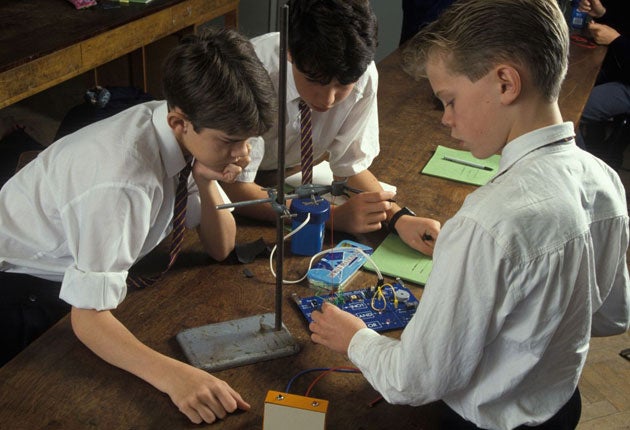Teaching science: A physical solution
Physicists don’t want to teach biology and chemistry? Get them to teach maths instead, suggests Christopher White

Who is teaching your children? Or rather, our children. Their education is often said to be the greatest investment we can make, and yet those put in charge of it aren’t necessarily guaranteed to be experts in their subjects.
If the mind is a fire to be kindled then it can be lit up by almost any good teacher, but evidence suggests that it’ll burn brightest and longest if fuelled by a specialist – someone with a deep knowledge of, and love for, the material they’re teaching. For some subjects they’re in desperately short supply.
This is particularly true of physics. As teachers and students return for another year of lessons, around 500 state schools in England are still without a proper physics teacher. And although the latest batch of 650 newly qualified ones beginning their careers earlier this month is the largest for 30 years, it’s still shy of the 1,000 that would have to be recruited every year for a decade and a half for their number to reach parity with biology teachers.
The shortage of specialists may partly be because they’re forced to generalise. Prospective physics teachers also have to learn how to teach one of the other disciplines that come under the catch-all umbrella of “science”.
It was with laudable aims, including increasing uptake at A-level, that this one subject was formed out of three separate areas more than 20 years ago – but it had this unintended consequence, too. “Both schools and teacher-trainers were thinking in terms of a subject called ‘science’,” explains the Institute of Physics’ director of education and science, Peter Main. “So if you wanted to teach physics, you were a science teacher.”
It can lead to subjects being taught by, essentially, the wrong teacher even where there is a specialist available. “There is this paradoxical situation where in some schools you’ve got physics specialists teaching biology, and in the same school you’ll have biology specialists teaching physics,” adds the institute’s head of pre-19 education Charles Tracy, a former physics teacher. “It’s often just slackness in timetabling, where it’s easier to say there’s a subject called ‘science’ and it doesn’t matter who teaches it, rather than trying to allocate specialists to teach their topics.”
For talented physics graduates who have no particular love for biology or chemistry, the prospect of having to teach either can easily pour cold water on any educational ambitions they might have. It’s a query that comes up at careers events, according to Tracy. “Undergraduates frequently ask, ‘If we go into teaching physics, will we have to teach biology and chemistry?’,” he says. “They might not – it depends on where they get a job. But there’s still an ethos in many schools that there is a subject called ‘science’.”
The number of potential teachers it puts off is difficult to determine, but around a quarter of physics graduates who do enter the profession choose to train as teachers of maths rather than of their own subject. Could the solution be to combine the two subjects, allowing trainee physics teachers to have maths rather than chemistry or biology as their secondary subject?
It is thought that this would also attract more engineering graduates into teaching. For engineers, as for physicists, maths is an everyday tool in which they are inevitably proficient, whereas they may not have studied biology or chemistry themselves since the age of 16.
A handful of teachers, such as Watford Grammar School’s David Weston, do work with this combination of physics and maths already. An engineering graduate, he prefers this to having to teach across all the sciences. “There are some obvious crossovers in which you teach the same material in both – like mechanics.”
Having not studied biology since GCSE, Weston isn’t particularly confident with relatively simple facts. “I’m trying to remember like, ‘How many kidneys have we got again? Oh, that’s right...’,” he jokes.
Weston has been a teacher for nine years but, having taken a break from the profession, was only tempted back by an offer of teaching maths.
While this one difference would clearly not keep hold of all science teachers, it is thought it could go some way to improving retention. The government is believed to be giving its backing to having physics and maths, rather than biology or chemistry, as a combination for trainee teachers. “It’s certainly something we are looking at,” a spokesperson for the Department for Education confirmed.
A pilot programme involving |Oxford University will allow trainee teachers to opt for the combination of maths and physics – and then the evidence should speak for itself. “If we get a cohort through that are trained in it, we would expect them to be snapped up by some schools,” says Tracy. “And then we can follow them through and show that it works – show they’ll get high-quality teachers.” Teachers who, given the choice, we might prefer to have teaching our children.
Christopher White is policy communications officer at the Institute of Physics
Join our commenting forum
Join thought-provoking conversations, follow other Independent readers and see their replies
2Comments